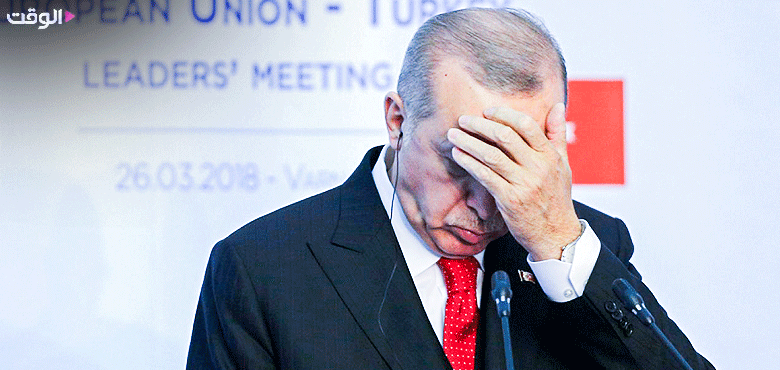Alwaght- The story of Turkey’s accession to the European Union after decades of talks and ups and down is quite like the Myth of Sisyphus in the 1942 philosophical essay about absurdity by the prominent author Albert Camus. Every time the puzzle of the Turkish membership looks close to completion, all of sudden, everything breaks down and efforts collapse.
Last week’s EU statement about the stalled talks with Ankara reaffirmed the absurdity of the Turkish attempts to join the European bloc.
EU’s inconsistent stance while Erdogan and his ruling Justice and Development Party (AKP) are living their toughest times since assuming the power in the country in 2002 does not look accidental. But why does the EU close the doors to negotiations at the present time, or at least as long as Erdogan is in power?
Closing the door of talks to Ankara
The European Commission on October 19 officially announced the suspension of Ankara's accession talks. The statement said that under the government of Turkish President Recep Tayyip Erdogan, democracy and the rule of law have been continuously undermined and the recommendations of the EU last year have been ignored. Although Erdogan stressed last spring, and while the two sides were working to patch up things to pave the way for the membership of the half-Asian-half-European country, Ankara is no longer serious about implementing the Brussels-demanded reforms.
The statement also criticized the lack of genuine separation of powers and spoke of the EU's concern about the backsliding on democracy, the rule of law, constitutional rights, and the independence of the judiciary. Although the Turkish government reacted to the statement by calling it a "dual standard approach" and rejected the "baseless allegations and unfair criticism" and accused Brussels of failing to fulfill its obligations to Turkey, the reality is that the new European decision should be taken as the end of the negotiations with the Erdogan administration.
More precisely, the direct reference to Erdogan as the main cause of the human rights conditions’ deterioration, the lack of separation of powers, and instability in West Asia region is a signal to walking back from any Brussels compromises to Ankara at least up to 2023, the year of the Turkish parliamentary and presidential elections.
After 2005, when the AKP gradually consolidated its power base, Erdogan was influenced by the ideas and strategies of his contemporaneous advisor and Foreign Minister Ahmet Davutoglu who encouraged the then PM Erdogan to go to intensive negotiations with the European bloc.
By directions from Davutoglu, Turkey embarked on political and economic reforms and even took steps to settle decades-long dispute with the Kurds. In 2009, Turkish National Intelligence Organization (MIT) negotiated with archenemy Kurdistan Workers’ Party (PKK) and in 2013 struck a deal defusing years of fighting. Although initially things went well between Ankara and Brussels but in 2016 and after an attempted army coup against Erdogan, their ties went frayed and increasingly chilly. At present, Erdogan’s policies are a snowballing challenge to the bloc, and odds are it will not engage in serious dialogue with Turkey before end of Erdogan rule.
Erdogan’s useless modification of “pivot to East” approach
The Turkish leader put the policy of proximity to the East on the agenda following the failed July 15 power grab attempt, which, according to intelligence reports, was backed by European countries and the US. In the meantime, Turkey increasing moved closer to Russia and China, two new global game-changers. In that period, even ties with the US’s allies in West Asia and North Africa went strained. The purchase of the Russian S400 system, the stubborn hostility to the Syrian Kurds as US allies in northern Syria, the escalation of tensions with Greece, Egypt and the Israeli regime, and the attempt to expand its presence in the Mediterranean were policies that effectively led to Ankara ouster from the Western camp.
Still, the economic woes and Erdogan’s coming short of relative success in his pivot to East policy over the past few months pushed him to review pro-Eastern policy and look West again. The economy is severely fragile, with each US dollar now trading 9 Turkish liras in unprecedented national currency price slump. This is rendering the citizens disappointed with economic management of the country. In the spring, Erdogan moved to de-escalate with the EU and the US but practically made no progress.
The new EU behavior has a translation: We strongly want an end to Erdogan period. Recently, the EU foreign ministers decided to impose sanctions on Turkey for its “provocative” actions against Cyprus. Also, it is likely President Joe Biden’s administration announces economic restrictions on Ankara. All these sanctions are directed against Erdogan with one aim: Undermining the Turkish economy. And they specifically tell of failure of his policy of heading back to the West.



























